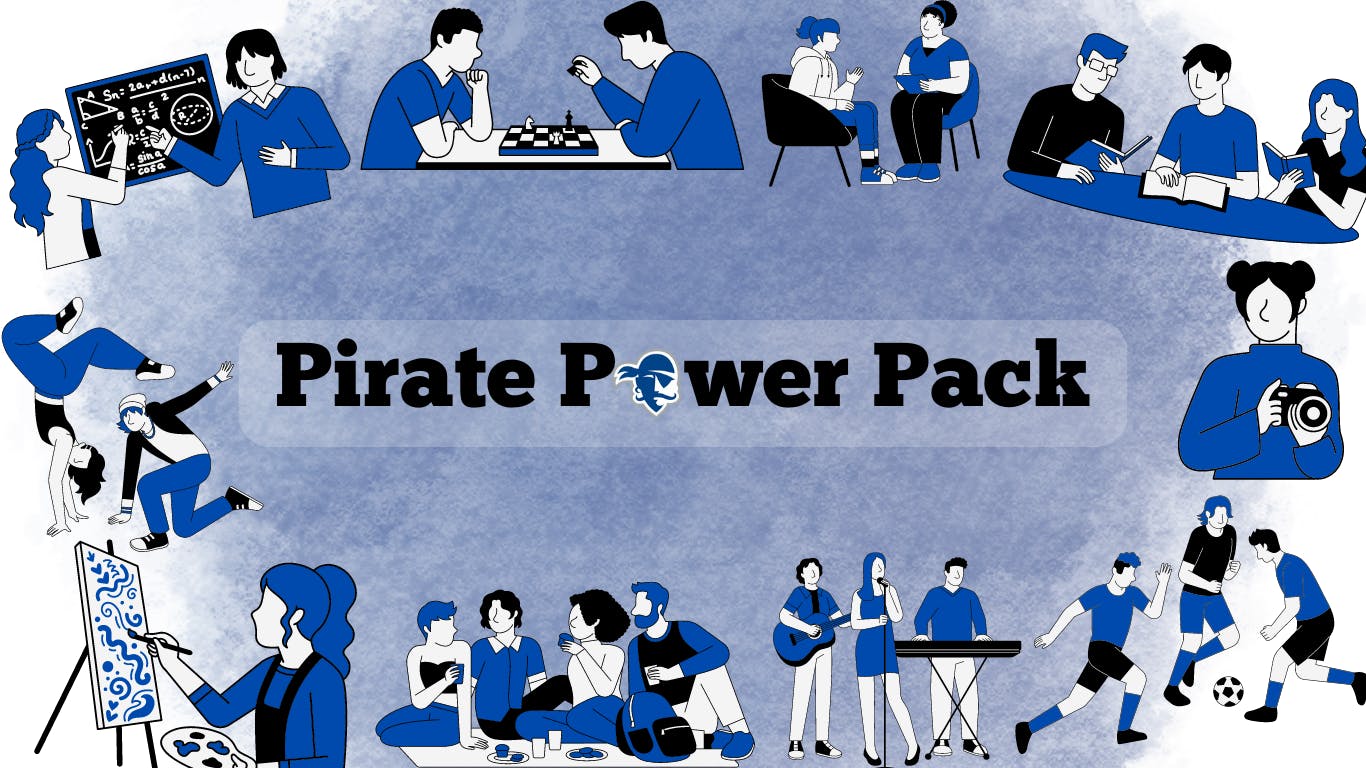
Graphic designed by Sofia Kasbo | The Setonian
Entering your first year of college is exciting but can also feel overwhelming. From navigating campus to figuring out where to get help, Seton Hall University offers a wealth of resources to guide you. This article will break down everything you need to know to succeed, from academic advising to mental health resources, tutoring, and student involvement opportunities. In addition, Student Success Advisors and upperclassmen offer first-hand advice and tips and tricks for your first year.
Start with your advisors
One of the first steps every incoming freshman should complete is connecting with their academic advisors. Dr. Jacqueline Galler, a student success advisor, encourages first-year students to “ask for help and utilize the support services in place for them at Seton Hall.” Advisors are there to help you plan your courses, ensure you’re on track to graduate, and connect you with any additional support you may need.
It is also important to reach out to your peer advisors, who are fellow students trained to help you navigate campus life. They were once in your shoes and can offer valuable insights and advice, especially during your first semester. They will be with you every step of the way in your University Life class and beyond.
Mental health and wellness
College can be stressful, and Seton Hall ensures every student has access to mental health resources. Counseling and Psychological Services (CAPS) offers free, confidential counseling sessions. Whether you’re feeling overwhelmed, homesick, or just need someone to talk to, CAPS is here to help.
Additionally, Seton Hall’s Health Services offers wellness programs, stress management workshops, and other resources aimed at supporting both mental and physical health. You can make an appointment with Health Services in the Student Health Panel app on PirateNet.
Notably, the university provides access to initiatives such as Dare to Care, a university-wide suicide prevention initiative designed to promote mental health awareness and foster a community of care. This program offers resources, activities, and training opportunities to help students manage their mental health and support others.
Students can also access a free one-year subscription to the Headspace app, which provides guided meditation and mindfulness tools to improve sleep, build healthy habits, and reduce stress. For those struggling, Seton Hall’s HOPE website offers vital suicide prevention resources, and student organizations can apply for Dare to Care support to enhance mental health and wellness programming across campus.
Tutoring and academic support
If you find yourself struggling with any of your classes, do not hesitate to seek help. The Center for Academic Success offers tutoring services in various subjects. Whether you need assistance with writing, math, or science, trained tutors are available to help. The Writing Center is another valuable resource for help with essays, research papers, or understanding your assignments better.
Campus Inclusion and Community Center: Seton Hall values diversity, equity, and inclusion. The Campus Inclusion and Community Center fosters a welcoming environment by promoting cultural awareness and providing support for underrepresented groups on campus. The center hosts events, workshops, and resources to ensure that every student feels like they’re part of the university community.
Transfer students: The Transfer Student Center provides guidance and support for students transitioning to Seton Hall. Whether you need help navigating the transfer process or adjusting to university life, the center offers personalized advising, orientation programs, and resources tailored to transfer students.
Additional student resources: The Academic Resource Center (ARC) is a vital support system for students seeking academic advising, study strategies, and personal development. Additionally, the KNOW MORE initiative provides education and resources on topics like consent, healthy relationships, and preventing sexual violence. The Career Center is available to help with internships, resume building, career counseling, and preparing for your post-graduation journey.
Students can explore the Student Services Toolkit, which includes these resources and many more aimed at ensuring student success, well-being, and involvement.
Allison Bodaken, a junior diplomacy and international relations major, shared her experience seeking out academic support.
“Managing time correctly is the biggest thing I had to learn,” Bodaken said. “My classes are a lot more challenging now, but staying organized and managing time helps a ton.”
Mackenzie Baker, a junior political science major in the 3+3 law program, also shared her thoughts on staying ahead in your first year.
“Being proactive about assignments and building relationships with professors early on made a huge difference for me,” Baker said. “Don’t be afraid to visit office hours—it’s one of the most underutilized resources.”
GPA requirements and staying on track
At Seton Hall, maintaining a solid grade point average is essential for keeping scholarships, honors program standing, and meeting requirements for your major. Check with your advisor about specific GPA benchmarks and take advantage of academic support services early if your grades start slipping.
Meal plans and campus dining
Navigating your meal plan is an important part of settling into campus life. Seton Hall offers a variety of meal plan options depending on how often you plan to eat on campus. All students with a university housing assignment (except those in Ora Manor or Turrell Manor) are required to have a meal plan. The default meal plan is Meal Plan U, but students have the option to upgrade. Meal plan options include:
Meal Plan U: Unlimited meals, 75 Pirate Bucks, and five guest swipes per semester ($2,850).
Meal Plan U-300: Unlimited meals, 300 Pirate Bucks, and five guest swipes per semester ($3,033).
Meal Plan U-700: Unlimited meals, 700 Pirate Bucks, and five guest swipes per semester ($3,363).
Meal Plan 2: 40 meals per semester, 75 Pirate Bucks, and one guest swipe ($575). This plan is available to commuters and residents of Ora Manor and Turrell Manor only.
Commuter students and those residing in Ora or Turrell Manor have the option to purchase a meal plan, but it is not required.
Pirate Bucks are additional dining dollars that can be used at any university eatery outside of the dining hall, while Pirate’s Gold is a debit account for purchases on and off-campus, including textbooks or snacks. Pirate Bucks carry over from the fall to spring semesters, but not from spring to fall, so be sure to use them before the academic year ends in May.
Meal plans can be adjusted until Add/Drop Day, and upgrades are allowed after this deadline by contacting the Department of Residence Life. Gourmet Dining Services (GDS) manages all dining-related services, including questions about food options, events in the dining hall, or interacting with the nutritionist.
From the University Center to the Main Dining Hall, students have several dining options on campus, including Starbucks, Pirate Dining Room, Dunkin’ Donuts, Jersey Mike’s, Pirate’s Express (C-Store), Pirate Ghost Kitchen, and Jubilee Cafe.
Student involvement: Engage and SHU’s involvement fairs
Looking to meet new people or get involved on campus? Attend involvement fairs, where you’ll discover a range of student organizations, clubs, and events. You can also explore different groups based on your interests and sign up with ease using Engage, Seton Hall’s platform for finding extracurricular activities. Bodaken offered advice on how important and easy it is to get involved.
“Sign up for everything you’re even remotely interested in, even if you know you won’t participate right away,” Bodaken said. “My freshman year, I signed up for almost 20 clubs at the Involvement Fair, and I’m still part of more than half.”
Tips for success from your peers
Upperclassmen like Bodaken and Baker gave valuable tips for first-year success. Bodaken emphasized the importance of staying organized.
“I use my calendar religiously,” Baker said. “Organizing my schedule and assignments in a visual way helps me stay grounded.”
Baker added that along with staying organized, it is important to go out and socialize.
“Put yourself out there! I know it’s hard, but everyone is just as nervous as you,” Baker said. “Surround yourself with hardworking, balanced, kind people—it makes all the difference.”
No matter where you are in your journey, remember that Seton Hall has an entire network of support ready to help you succeed. From advising to student involvement, take full advantage of the resources available to you. Your first year is a time to explore, learn, and grow, so embrace it!
Ashley Evans is a writer for The Setonian’s News section. She can be reached at ashley.evans1@student.shu.edu.





